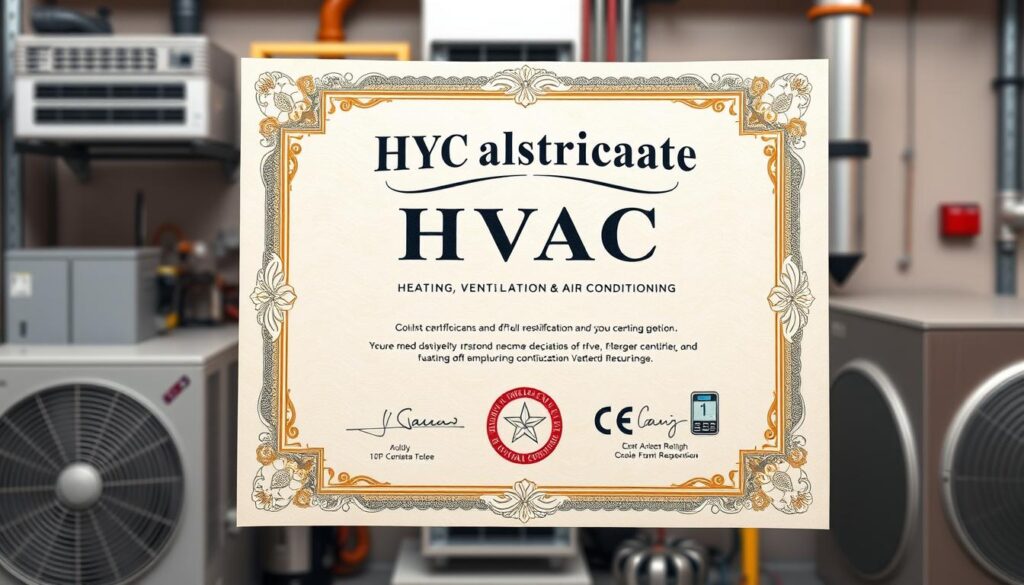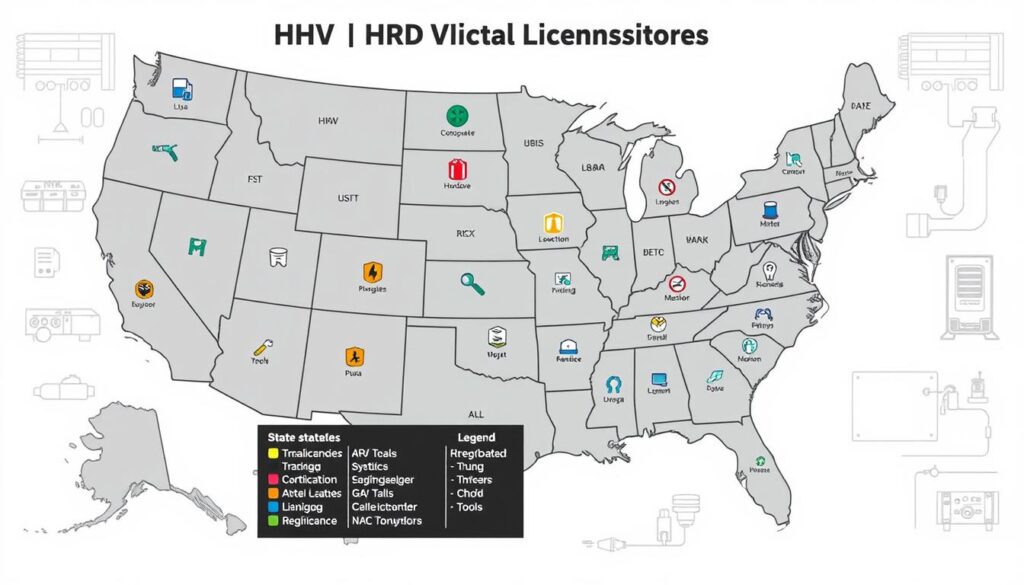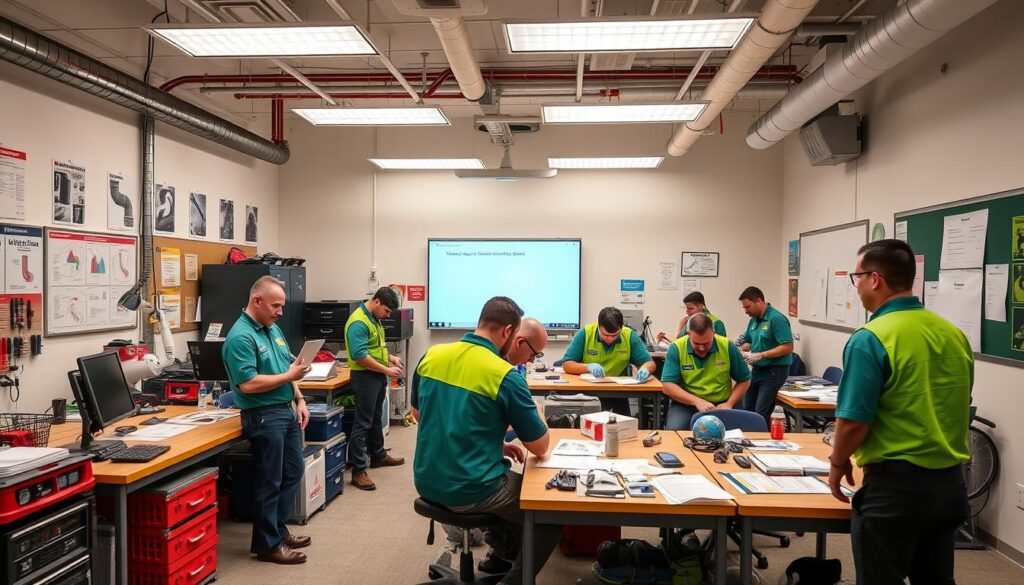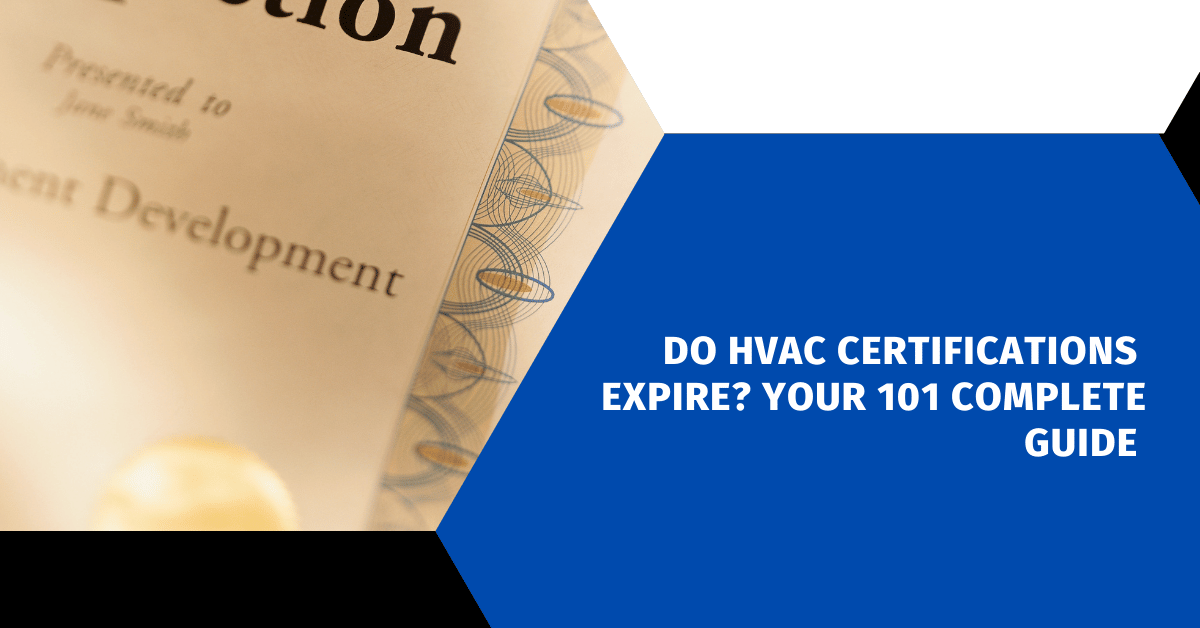Affiliate Disclosure
HVAC Guide Guys is a participant in the Amazon Services LLC Associates Program, an affiliate advertising program designed to provide a means for sites to earn advertising fees by advertising and linking to Amazon.
Do HVAC Certifications Expire? As an HVAC technician, you’re proud of your work and always aim to be the best. You might wonder, though, if your certifications last forever. Do they expire, and how do you keep them current? This guide will help you understand HVAC certification expiration and renewal.

Key Takeaways
- HVAC certifications usually last from 2 to 5 years, depending on the state and agency.
- To renew, you often need to finish continuing education courses and pass an exam.
- You must get a certain number of continuing education credits to renew your certifications.
- Renewal costs and deadlines vary by certification level. Missing them can have serious consequences.
- Keeping your certifications up-to-date can open better job doors, increase your pay, and keep your reputation strong.
Table of Contents
Understanding HVAC Certification Basics
Starting a career in HVAC means learning about different certifications. These show your skills and help follow state and federal rules. Let’s look into HVAC certifications and why they’re key for your career.
Types of HVAC Certifications
The HVAC field has many certifications for various skills and areas. Some top ones are:
- EPA Section 608 Certification: Needed for anyone working with refrigerants. It has four levels based on the equipment.
- NATE (North American Technician Excellence) Certification: NATE has levels from beginner to expert. It shows your skills and experience.
- HVAC Excellence Certification: For advanced technicians, it shows your knowledge in HVAC systems.
- ASHRAE (American Society of Heating, Refrigerating and Air-Conditioning Engineers) Certification: ASHRAE focuses on energy and system design. It’s about making buildings better.
Why HVAC Certification Matters
Getting HVAC certifications is very important. They show you know your stuff and are serious about your job. They also make you more appealing to employers. Plus, they can help you earn more and move up in your career.
State vs. Federal Requirements
Federal rules, like EPA Section 608, are a must for all HVAC/R techs. But, state rules can differ. You need to check the rules in your state to make sure you’re qualified.
EPA Section 608 Certification: The Essential Credential
As an HVAC professional, getting the EPA Section 608 certification is a must. This certification is needed for those working with equipment that could release refrigerants. It ensures they follow environmental laws, handle refrigerants right, and stay safe. The EPA Section 608 certification has four types, each for different appliance categories:
- Type I for small appliances
- Type II for high-pressure systems
- Type III for low-pressure systems
- Universal certification for all types of equipment
This certification does not expire, making it a permanent and key credential. It’s especially important because of the growing need for HVAC/R technicians. This is due to the environmental impact of refrigerants.
The U.S. Bureau of Labor Statistics says HVAC/R technician jobs will grow 9% from 2023 to 2033. This is much faster than the average job growth. With the EPA Section 608 certification, HVAC/R professionals show they know about EPA certification, refrigerant handling, and environmental protection. This puts them in a great spot for success in this fast-growing field.
“The EPA Section 608 certification is a one-time essential credential for HVAC/R professionals, ensuring they adhere to environmental regulations and handle refrigerants safely.”
| Certification Type | Appliance Category | Exam Questions | Certification Cost |
|---|---|---|---|
| Type I | Small Appliances | 50 (25 Core + 25 Type I) | $125 |
| Type II | High-Pressure Systems | 50 (25 Core + 25 Type II) | $125 |
| Type III | Low-Pressure Systems | 50 (25 Core + 25 Type III) | $125 |
| Universal | All Types of Equipment | 100 (25 Core + 25 Type I + 25 Type II + 25 Type III) | $125 |
Explore Our HVAC Shop
Looking for top-rated HVAC tools, parts, and accessories? Visit our shop and find the perfect solution for your needs.
Visit the ShopDo HVAC Certifications Expire?
Many HVAC technicians wonder if their certifications expire. Some, like the EPA Section 608, don’t expire. But others need renewal to stay active. Let’s explore how long certifications last, when you need to renew, and how to keep your credentials current.
Certification Duration Periods
The length of HVAC certifications varies a lot. For example, NATE certifications expire about 2 years after you get them. You must complete 16 hours of continuing education every 2 years. You also need to show NATE you’ve done the credits to avoid expiration. But, EPA 609 certification for car ACs doesn’t expire.
Renewal Requirements
To renew HVAC certifications, you must show you’re still learning. HVAC Excellence certification exams have different levels. The Professional and Master Specialist levels require 2 and 3 years of experience, respectively. These exams have 50 to 100 questions and sometimes include a hands-on test.
Maintaining Active Status
To keep your certifications active, you need to document your experience and keep up with industry changes. NC3 offers various HVAC certifications, including ones for residential and commercial work. It’s important to stay current with new technologies and rules to keep your certifications valid.
Knowing when your HVAC certifications expire and how to renew them is key. It helps you keep your skills sharp and provide excellent service. By staying informed and proactive, you can keep your certifications current and continue to offer top HVAC services.
NATE Certification Requirements and Validity
The NATE (North American Technician Excellence) certification is a top choice for HVAC techs. It’s known for being respected and recognized across the industry. To get NATE certified, you go through four steps: Ready-to-Work, HVAC Support Technician, NATE Certification, and Senior Level HVAC Efficiency.
To earn the NATE Certification, you need to pass a core and a specialty exam. This certification lasts for two years. You can renew it by taking more classes or by retaking the exams. NATE suggests having about 2 years of experience before trying the exams.
Renewing your NATE certification is easy. You can either get 16 continuing education hours (CEHs) every two years or retake the specialty exam. The cost for renewal is $30 for the first specialty and $5 for each additional specialty with CEHs.
It’s important to keep your NATE certification active. You have to recertify within a year of when it expires. If it lapses, you’ll need to retake the exams to get certified again. The cost for recertification is between $25 and $30 per certification.
NATE-certified technicians must follow the Code of Conduct. This includes providing safe and quality services, staying technically competent, and respecting diversity.
By getting NATE certified and keeping it up to date, HVAC techs show their skills. They stay current with the latest industry practices. This certification is a big plus for any HVAC pro wanting to grow their career and offer top-notch services.
Explore Our HVAC Shop
Looking for top-rated HVAC tools, parts, and accessories? Visit our shop and find the perfect solution for your needs.
Visit the ShopHVAC Excellence Certification Timeline
HVAC Excellence is a top name in HVAC certifications. It started in 1994 and has been helping HVAC/R professionals grow. They offer many certifications, from beginner to expert levels, to meet different needs.
Entry-Level Certifications
HVAC Excellence has programs for high school students. The H.E.A.T. and H.E.A.T. Plus programs check if students and teachers are ready for HVAC/R careers.
For those with some college or HVAC/R experience, HVAC Excellence has Employment Ready certifications. These cover many areas, like Electrical and Fuel Oil Combustion, to help start a career in HVAC/R.
Professional-Level Requirements
The Professional Technician certifications are for seasoned HVAC/R pros. You need two years of work experience and pass the Core Exam to get them. Then, you can focus on areas like Gas Heat and Heat Pump Service.
Specialty Certifications
HVAC Excellence also has Master Specialist Certifications for those with more experience. You need at least three years of work and a professional-level certification. These cover a range of skills, from Residential Gas Furnace to Envelope Leak Testing.
Since 1999, HVAC Excellence has been focused on technical skills. They started programmatic accreditation to help students get ready for HVAC/R jobs.
Keeping your HVAC Excellence certifications current is key. Check with the issuer to make sure your credentials are still good.
State-Specific HVAC Licensing Requirements
HVAC certifications and licenses differ from state to state. While the EPA Section 608 certification is needed everywhere, states have their own HVAC regulations and local requirements. These rules are crucial for HVAC technicians to work legally in their area.
HVAC pros need to check the state licensing rules for their area. These might include certain education, work experience, and tests. These are more than just the EPA certification.
- In California, HVAC contractors need a state license, pass a trade exam, and have 4 years of journeyman experience.
- Alabama asks for an apprenticeship certificate or similar work experience for HVAC contractors.
- Arizona requires 4 years of HVAC work or 2 years with an apprenticeship or vocational training for a contractor license.
- Connecticut’s HVAC contractors must finish a recognized apprenticeship or have similar experience for a journeyman’s license.
Knowing these state-specific HVAC licensing rules helps HVAC pros work legally and safely. It’s important for their local market.
| State | HVAC Licensing Requirements | Exam Components | Fees |
|---|---|---|---|
| California | 4 years of journeyman-level experience | Trade exam, Law & Business exam | $650 (application + initial license) |
| Alabama | Apprenticeship certificate or equivalent experience | N/A | N/A |
| Arizona | 4 years of HVAC experience or 2 years with apprenticeship | N/A | N/A |
| Connecticut | Recognized apprenticeship program or equivalent experience | N/A | N/A |
Understanding the state licensing rules for HVAC helps you follow them. It sets you up for success in the field.

Explore Our HVAC Shop
Looking for top-rated HVAC tools, parts, and accessories? Visit our shop and find the perfect solution for your needs.
Visit the ShopASHRAE Certification Programs and Duration
The American Society of Heating, Refrigerating and Air-Conditioning Engineers (ASHRAE) has many certification programs. These help HVAC professionals grow in their field. They focus on building energy efficiency, HVAC design, and building performance.
Available Certifications
- Building Commissioning Professional Certification
- Building Energy Assessment Professional Certification
- Certified HVAC Designer Certification
- Healthcare Facility Design Professional Certification
- High-Performance Building Design Professional Certification
- Operations and Performance Management Professional Certification
- Building Energy Modeling Professional Certification
Renewal Process
ASHRAE certifications need to be renewed every few years. To renew, you must complete continuing education and pass a recertification exam. For example, the Certified HVAC Designer certification is good for three years. After that, you must renew by showing you’ve kept up with your field and passing a test.
ASHRAE certification exams are available all year at over 1,000 testing centers worldwide. You must take your exam within 90 days of getting approved. The exams have multiple-choice questions, with the number depending on the certification. The pass rates for exams up to September 2021 range from 49% to 79%. The scores needed to pass range from 63 to 83 out of a certain total score.
To keep your ASHRAE certifications, you must keep learning and growing. This ensures HVAC professionals are always up-to-date with the latest in building energy efficiency and HVAC design.
Safety Certifications and OSHA Requirements
In the HVAC industry, safety is a top priority. OSHA sets safety training rules, but it doesn’t specify what to teach. So, the HVAC field has created its own safety programs. These ensure technicians know how to work safely.
The main OSHA training for HVAC pros is the 10-hour and 30-hour courses. These cover job safety, health risks, and following the rules. Some places and bosses might need HVAC techs to have OSHA training for safety.
- OSHA 10-hour course: Good for new HVAC workers, teaching basic safety.
- OSHA 30-hour course: For leaders, it dives deep into safety rules and best ways to work.
OSHA training doesn’t expire, but it’s wise to update safety knowledge every 3 to 5 years. This keeps up with new laws and ways of working. Regular training lowers the chance of accidents and injuries. It also saves employers money and avoids legal trouble.
“OSHA-certified employees can improve employee morale, productivity, and regulatory compliance while avoiding fines and penalties.”
OSHA rules don’t cover self-employed folks, federal workers, or places like mines and nuclear plants. Yet, employers in these areas might still use OSHA safety plans. This keeps their workers safe.
Getting OSHA safety certifications shows HVAC pros care about safety. It makes them more attractive to employers and helps the whole industry. This creates a safer work environment for everyone.
Explore Our HVAC Shop
Looking for top-rated HVAC tools, parts, and accessories? Visit our shop and find the perfect solution for your needs.
Visit the ShopMaintaining Your HVAC Credentials
Keeping your HVAC certifications and licenses up to date is key for your career growth. It ensures you meet industry standards. You need to complete HVAC continuing education and keep records of your work and credentials.
Continuing Education Requirements
The continuing education needed to renew your HVAC certifications varies. But, most require you to finish a set number of hours of approved training every one to three years. This training can be from conferences, workshops, or online courses.
It’s important to stay current with HVAC tech, best practices, and laws. This helps you keep your credentials and serve your clients well.
Documentation and Record Keeping
Keeping accurate records is crucial for credential maintenance. You should track and save all your training, coursework, and work experience. This is for meeting your certification and license renewal needs.
Make sure to keep copies of certificates, transcripts, and other important documents. Without the right paperwork, your HVAC credentials could expire or be suspended.
| Credential | Renewal Frequency | Continuing Education Requirements |
|---|---|---|
| NATE Certification | 2 years | At least 16 hours of approved training |
| HVAC Excellence Certification | 3 years | Varies by certification level, but typically 8-24 hours of approved coursework |
| EPA Section 608 Certification | Lifetime, but requires periodic recertification | Passing the EPA certification exam with at least a 70% score in each relevant section |
By focusing on continuing education and keeping detailed records, you keep your skills sharp. This ensures your business stays compliant and your clients get top-notch service.

Replacing Lost Certification Cards
As an HVAC pro, keeping your credentials up is key for your career and following rules. But, sometimes, your certification cards can go missing. Don’t fret – you can get your lost certification and HVAC credential verification back.
First, reach out to the group that gave you your original certification. It could be the EPA for your Section 608 certification, NATE, or another group. They’ll help you with the certification replacement steps. If the group that gave you your certification is closed, look for a replacement card form on their list.
At times, you might have to take the certification test again. This is true for older certifications or those from closed programs. You’ll need to share details like when you got your certification or where you took the test.
| Certification Type | Replacement Process |
|---|---|
| EPA Section 608 | Contact the original certifying organization or check the list of defunct organizations for a replacement form. |
| NATE | Contact NATE directly to request a replacement certificate. |
| State-Specific Licenses | Contact the state licensing board to obtain a new license or certification card. |
It’s important to keep your HVAC certifications in order. Stay on top of your credentials and have them ready when needed. This way, you won’t have to deal with certification replacement issues later.
“Replacing lost certifications can be a hassle, but it’s essential for HVAC professionals to maintain their credentials and demonstrate their expertise to employers and clients.”
Explore Our HVAC Shop
Looking for top-rated HVAC tools, parts, and accessories? Visit our shop and find the perfect solution for your needs.
Visit the ShopCareer Advancement Through Certification
Getting HVAC certifications can really boost your career. These credentials show you’re an expert and open new doors in the field.
Certifications can also increase your pay. For example, NATE’s Senior Level HVAC Efficiency Certification makes you more valuable to employers. This can lead to better jobs and more money.
Also, certifications make you stand out. Employers look for people with proven skills and credentials. This means you’re more likely to do great work and make customers happy.
| Certification | Duration | Renewal Requirements |
|---|---|---|
| NATE Certification | 2 years | 16 continuing-education hours |
| HVAC Excellence Certification | Varies by level (basic to master-level) | Depends on certification level |
| EPA Section 608 Certification | Does not expire | Retake exam if card is lost |
Keeping and growing your HVAC certifications shows you’re serious about your career. It proves you’re committed to learning and staying current. This can lead to more HVAC career growth, professional development, and recognition in the industry.
“HVAC certifications are crucial for safety in the industry and can demonstrate knowledge and expertise to install, maintain, and repair HVAC systems, as well as diagnose and fix issues.”
Conclusion
HVAC certifications are key to showing you know your stuff, following the rules, and moving up in your career. Some, like the EPA Section 608, don’t have an expiration date. But others need to be renewed to keep your credentials valid. It’s crucial to keep up with your certifications and industry standards to grow professionally and succeed in HVAC.
Getting and keeping the right HVAC certifications proves your skill and helps keep the industry safe and honest. These certifications show you’re serious about your work. They help you offer top-notch services and build trust with your customers.
The HVAC field is always changing, so it’s important to know about new certification needs and best practices. By always learning and improving, you’ll open doors to new chances, better pay, and a fulfilling HVAC career.

